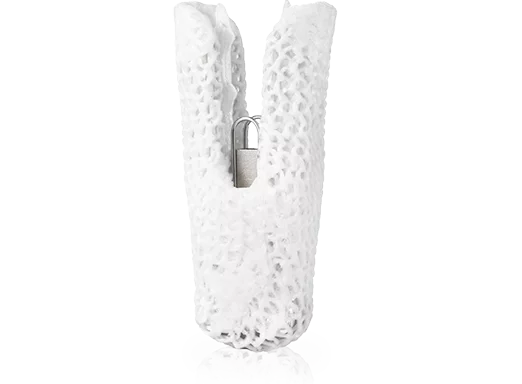MitraClip® Transcatheter Mitral Valve Repair
MitraClip® is a less invasive treatment option for those with mitral regurgitation.



The MitraClip® device
With MitraClip®, your specialist inserts a catheter through a vein in your leg to reach your heart, and attaches a small clip to your mitral valve. The MitraClip greatly reduces or stops the leaking of the valve by allowing your mitral valve to function more normally. This minimally-invasive procedure is performed if you are not a good candidate for traditional open-heart surgery.
The benefits:
- Less invasive than traditional open-heart surgery.
- Results in shorter hospital stays.
- Has a 73% reduction in hospital visits for heart failure.
- Improves your quality of life.

Image source: MitraClip.com
Symptoms of mitral regurgitation
Most people with chronic mitral valve regurgitation don’t notice any symptoms for a long time. People with mild or moderate mitral regurgitation often don’t have any symptoms at all. If the regurgitation becomes more severe, symptoms may start. They may then become stronger and happen more often over time.
These symptoms may include:
- Shortness of breath with exertion.
- Shortness of breath when lying flat.
- Tiredness (fatigue).
- Reduced ability to exercise.
- Unpleasant awareness of your heartbeat.
- Palpitations.
- Swelling in your legs, abdomen and the veins in your neck.
- Chest pain (less common).
Acute, severe mitral valve regurgitation is a medical emergency. It can cause serious symptoms such as:
- Symptoms of shock, such as pale skin, loss of consciousness or rapid breathing.
- Severe shortness of breath.
- Abnormal heart rhythms that make the heart unable to pump as well.
Acute mitral valve regurgitation is more likely to happen after a heart attack. It’s also more likely to happen after rupture of the tissue or muscle that supports the mitral valve. It can also happen after an acute injury or heart valve infection.
Causes
A range of conditions can cause mitral valve regurgitation. They include:
- Floppy mitral valve (mitral valve prolapse).
- Rheumatic heart disease from untreated infection with strep bacteria.
- Coronary artery disease or heart attack.
- Certain autoimmune diseases such as rheumatoid arthritis.
- Infection of the heart valves (endocarditis).
- Mitral valve problems present at birth (congenital).
- Support structures of the mitral valve break (rupture).
- Certain medicines.
- Abnormal function of the heart muscle (cardiomyopathy).
- Trauma.
Risk factors
You are more likely to have mitral valve regurgitation if you:
- Don’t get treated for a strep infection and develop rheumatic heart disease.
- Use IV drugs. These raise the risk for heart valve infection.
- Don’t get prompt treatment for health conditions that can lead to the disorder.
- Some risk factors you can’t change. For example, some conditions that can lead to mitral valve regurgitation are partly genetic.
The latest treatment for mitral valve regurgitation
If you think you might have this condition or you’ve already been diagnosed, come see us to discuss if MitraClip® should be part of your customized treatment plan to get your heart functioning normally once again.
Make an appointment at one of our structural
heart and valve locations
References
American Heart Association Journal. One-Year Outcomes After MitraClip for Functional Mitral Regurgitation (https://www.ahajournals.org/doi/full/10.1161/CIRCULATIONAHA.117.031733)
National Center for Biotechnology Information (NCBI): National Library of Medicine. Percutaneous mitral valve repair: The MitraClip device (https://www.ncbi.nlm.nih.gov/pmc/articles/PMC5642839/)





